Hide and seek
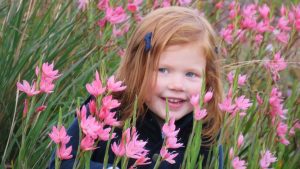 Imogen thought that if she could not see us we could not see her. Sometimes she crouched down in the flowers and closed her eyes thinking that she had vanished!
Imogen thought that if she could not see us we could not see her. Sometimes she crouched down in the flowers and closed her eyes thinking that she had vanished!
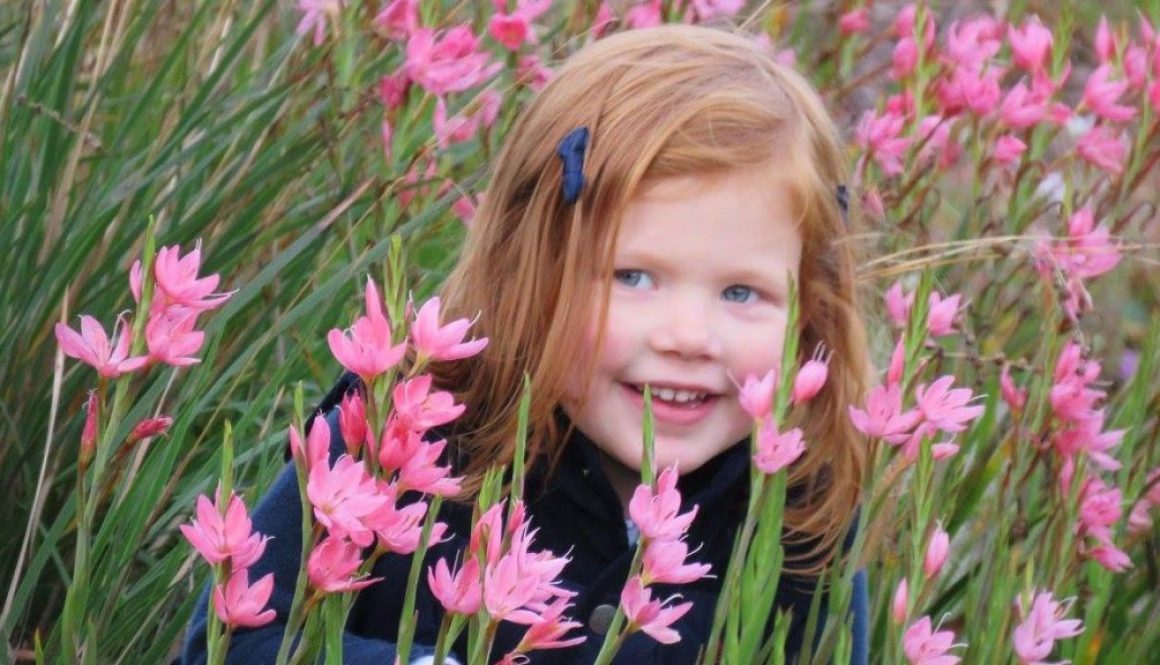
 Imogen thought that if she could not see us we could not see her. Sometimes she crouched down in the flowers and closed her eyes thinking that she had vanished!
Imogen thought that if she could not see us we could not see her. Sometimes she crouched down in the flowers and closed her eyes thinking that she had vanished!
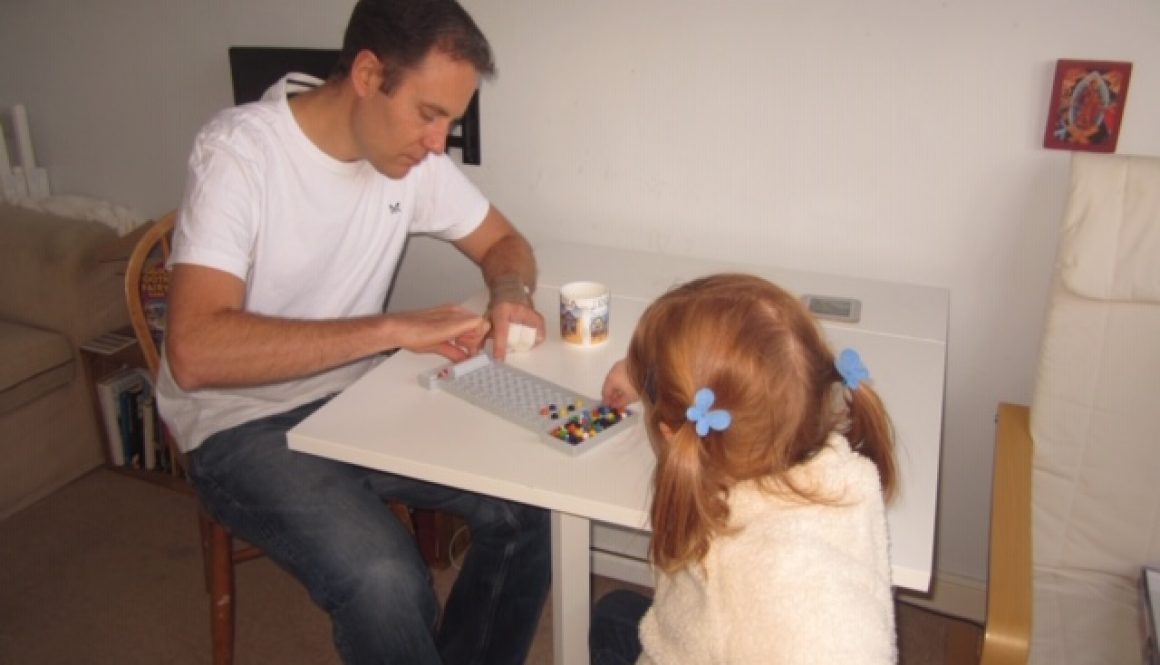
Imogen and Nicky came to visit in the winter of 2018. I had fallen and broken my wrist but we played mastermind which Imogen was really good at from a young age. Her combinations usually involved two or one colour. She found it funny when I followed her lead and called my black and yellow alternating pattern “the bumble bee ? “!
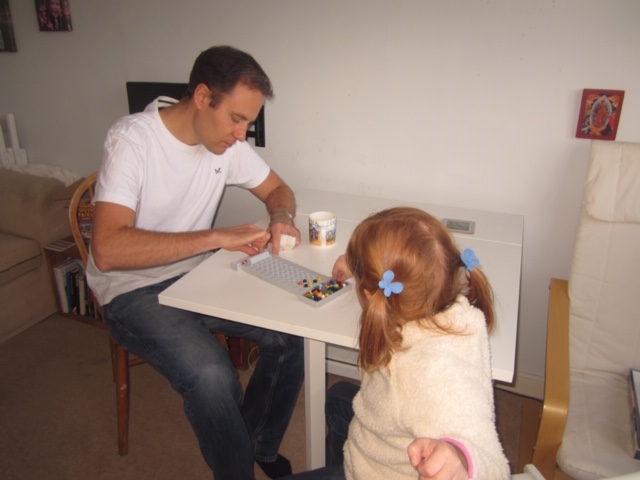

One of my all time favourite holidays was spent on the shores of this beautiful lake in Cumbria in Fenella’s cottage there with her and a lovely group of invited friends. One morning I swam in the lake and I will always remember how invigorating and awe inspiring it was to be in the midst of such a lovely creation.
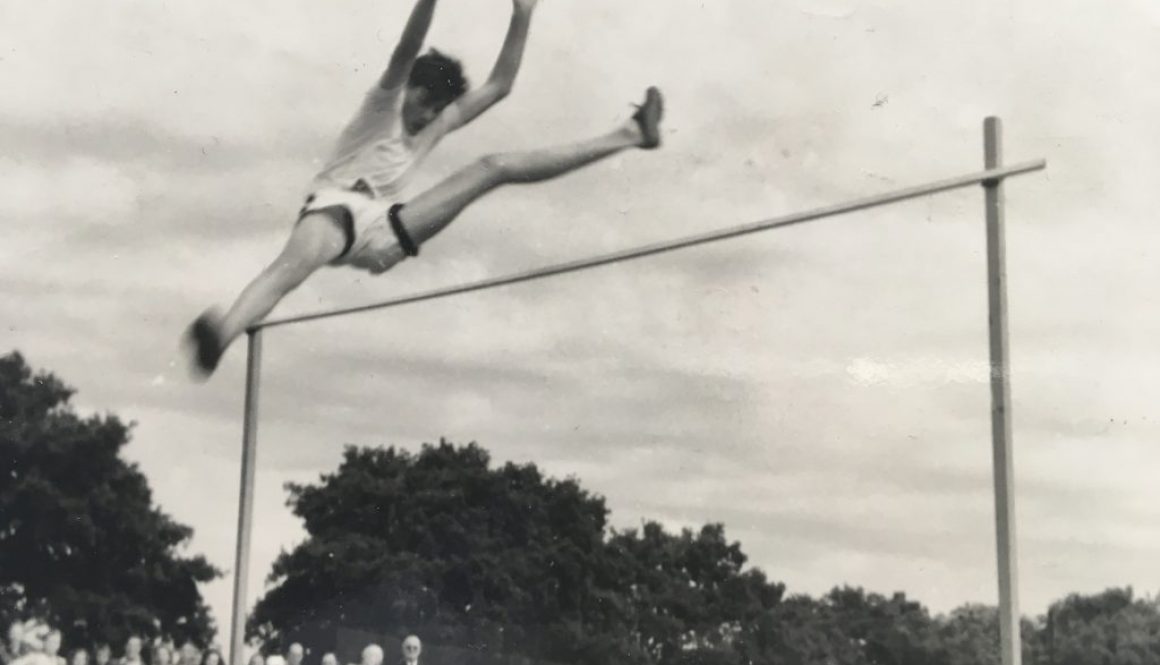
Dad was an amazing high jumper. He won the AAA championship in Crystal Palace with a jump of 6’1” which was his own height. He did so in the days before Fosbury Flop was possible because one had to land in a sand pit!
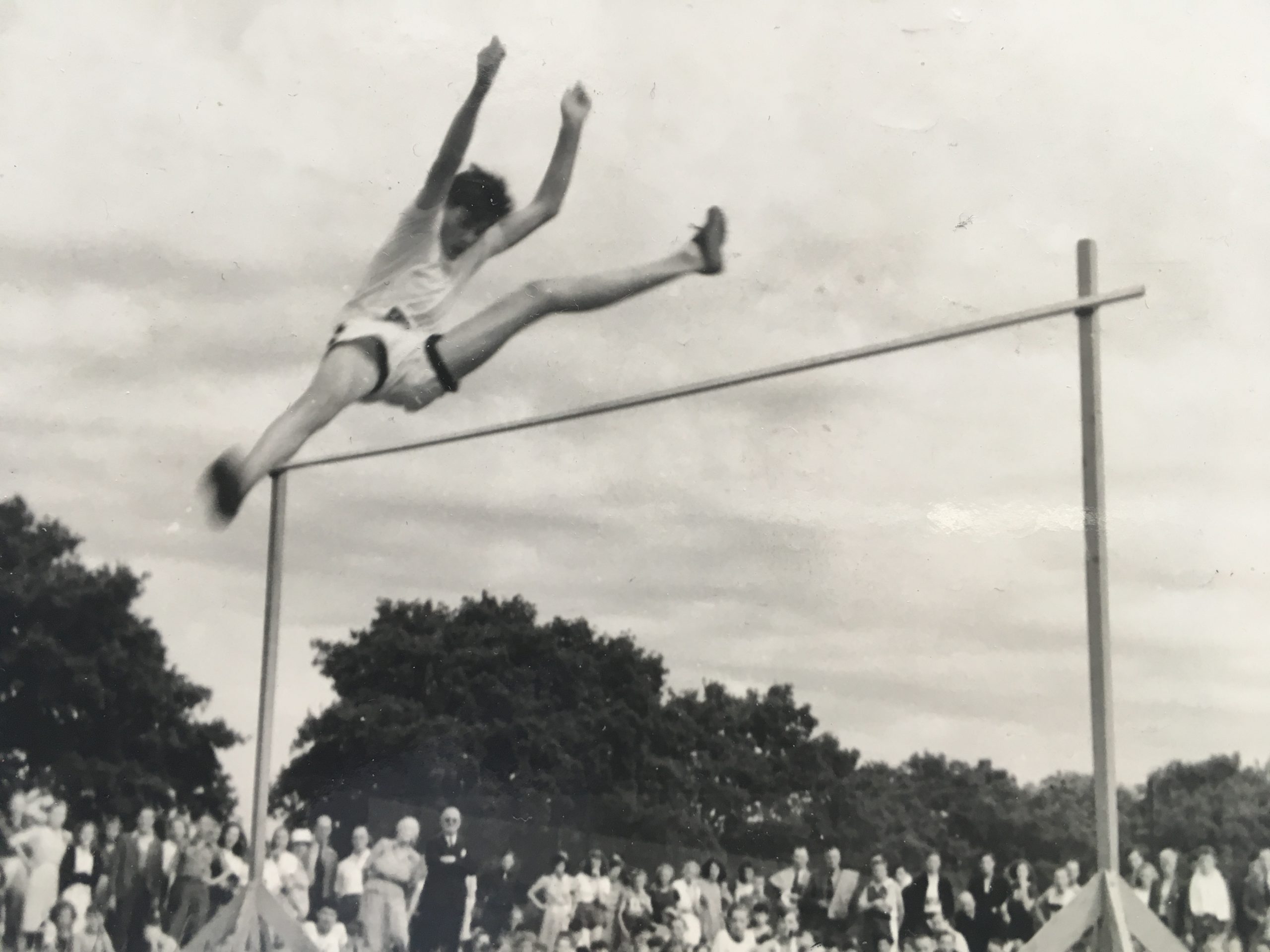
Dad was a gentle man who felt and thought deeply about the needs of society and especially teenage children who struggle behaviourally due to family problems or other issues. Having trained as a solicitor, he longed to work with social services. He was a man of great integrity who was not afraid to speak out if he felt compelled to do so on a point of principle, but he found animosity very hard to cope with. I wish with all my heart that this integrity had rubbed off on me more, as it did on Nicola. What did make a deep impression on me was the intimacy of the love that he knew with his heavenly Father and Shepherd of his soul, Jesus Christ. My bedtime prayers and little conversations with Dad introduced me to the Lord of all compassion and mercy, whose heart was tender to all that he had made, yet was furious about the suffering of the innocent and so passionate that no one should be lost to Him that he came to die in our place. I was given the children’s Bible on my Christening day, July 21st 1974 (which to this day Mum gives thanks for by lighting the original candle that she was given with these words from the baptism liturgy ‘ ‘ ). I remember looking through my Bible with Dad and coming to know through its pages the living God who parted the Red Sea to save his people; who saved Daniel from the lion den and who was with Shadrach, Meshach and Abednego in the furnace; who helped a Shepherd boy defeat Goliath and lead a nation; who was merciful to Jonah and to Nineveh; who leaves the ninety nine to search for the one lost sheep; who never gives up on the Prodigal son or the legalistic and insecure elder brother who is struggling to accept a love that’s not earned; who calls us to have fearless compassion, kindness and generosity like the good Samaritan and the widow in the temple, who Jesus knew had given all she had. I knew that this was a living God because he sent his only begotten Son to be one with us in every way, to face every temptation we face, to be baptised of water and the Holy Spirit, even though he was God, and to die for us and rise again – the moment in history that changes everything. I didn’t learn doctrine systematically but in the very Anglican way, I think, of liturgy and worship. These are the two hymns from Holy Trinity Cuckfield that I am very formed by:
There Is A Green Hill
There is a green hill far away,
outside a city wall,
where our dear Lord was crucified,
who died to save us all.
We may not know, we cannot tell
what pains he had to bear;
but we believe it was for us
he hung and suffered there.
He died that we might be forgiven,
he died to make us good,
that we might go at last to heaven,
saved by his precious blood.
There was no other good enough,
to pay the price of sin;
he, only, could unlock the gate
of heaven and let us in.
Lord Jesus, dearly you have loved,
and we must love you too;
and trust in your redeeming blood,
and live our lives for you.
Cecil Alexander
Living Lord
Lord Jesus Christ you have come to us
You are one with us, Mary’s Son.
Cleansing our souls from all their sin
pouring Your love and goodness in
Jesus our love for you we sing,
living Lord.
Lord Jesus Christ now and every day
Teach us how to pray, Son of God.
You have commanded us to do
this in remembrance Lord of you
Into our lives your power breaks through,
living Lord.
Lord Jesus Christ, you have come to us
Born as one with us, Mary’s Son.
Led out to die on Calvary,
risen from death to set us free,
living Lord Jesus help us see
You are Lord.
Lord Jesus Christ I would come to you
live my life for you, Son of God.
All your commands I know are true,
your many gifts will make me new,
into my life your power breaks through,
living Lord.
Patrick Appleford
When we were ready to pray, Dad would fold his hands around mine and say “My hands around your hands, God’s hands around our hands.” His hands around mine spoke of the security of faith. We often said Psalm 23 together as a prayer, and to this day I pray it in my mind (in the authorised version of the Book of Common Prayer that Dad loved so much) at times when I need courage and assurance. I remember praying it on the start line of my Boat Race in the nervous moments when the coxswains are trying to line their boats as the stream of not so still water gushes beneath the boat. Dad would always finish with the Lord’s Prayer and the blessing given to Aaron:
The Lord bless you , and keep you : The Lord make his face shine upon you , and be gracious unto you : The Lord lift up his countenance upon you , and give you peace (Numbers 6:24-26).
I have always found this to be a comforting reality. Nicky and I like to think that as Jesus intercedes for us in heaven (Hebrews 7:25), Dad’s prayer is the same for all of us.
Thanks to my father and my heavenly Father and the example of our vicar who visited us the morning Dad died to convey such compassion and assurance that dad was safe in the Father, I felt a call from God to be a parish vicar; to share this love and conviction of the sure and certain hope that only Jesus can give us at times such as this. Later on this calling deepened through the profound experience of serving Him as an acolyte in the preparation of the bread and wine to remember together the Lord – one full and perfect sacrifice. I felt the truth and reality of what we were participating in. Likewise, at baptisms I felt a tangible sense that the reality of Jesus’ resurrection life is present to us by the Holy Spirit in a profound way as we turn from death to life in repentance and faith, confessing the gospel that Jesus Christ is Lord – my Lord and Saviour, my God. I am so thankful for God’s grace in leading me to know his way, truth and life from these formative moments, and I thank God for a mother and father who were committed to bringing Nicola and I up in a loving Christian home.
Dad was 42 when I was born and whilst he loved to recount the scrapes that he and his brothers Norman and Raymond would get up to as children, I knew very little of his late teens and adult life until after he died when we found a photo album he had made and a drawer that was full of athletics and National Service awards for physical training and marksmanship. There was a collection of pocket diaries from his 20s that mainly had a record of the score of the Saturday game of ‘rugger’ for Old Reigatians! But there was an odd comment here and there which gave me treasured insights into what he was up to in work, church and socially. One comment that spoke of his awe of the nurses he had met over the years, and how he would like to marry a nurse, always used to make me happy because of course a decade later he met Mum in Oxford, where she was working at the Radcliffe Infirmary and he was working as a trainee social worker. They were married a few months later and set up home in Headington, where both Nicola and I were born.
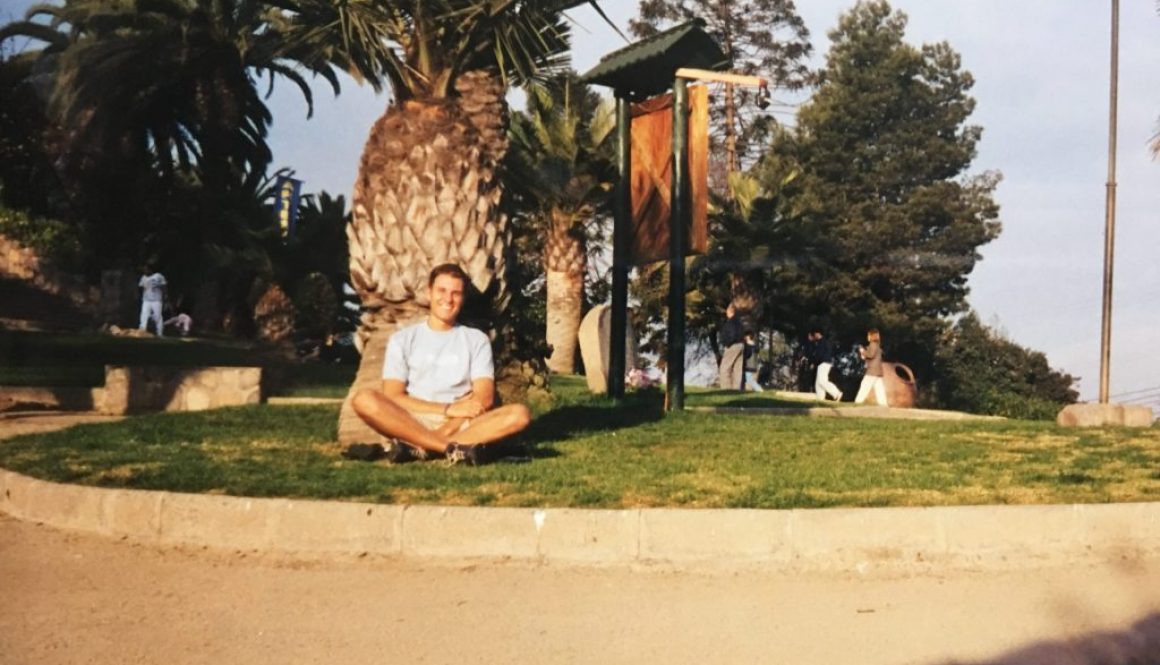
In 1998 I left management consulting to follow what turned out to be an optimistic attempt to ride the “dot com” wave and set up a mobile phone network. Before I joined Capital One Communications, I took my airmiles and bought a ticket to Mexico for a holiday with my great friend Nick and his lovely girlfriend ( now wife!) Sonya. For some reason (bearings have never been a strength of mine) I thought it would be nice to visit chile “on my way home “! It was almost as long a flight from Mexico City to Santiago as London to Mexico City! But I loved my week in chile travelling from Santiago to the beautiful Lake District north of Patagonia. The photos of me beside one of the lakes, has a volcano in the background which I had climbed with a group to the snow line the day before.

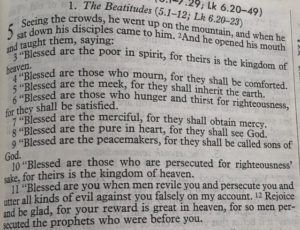
Thank you for having me, it is great to be amongst you again.
I’ve been a Christian since I was young, and I’ve known these famous words just read to us (called the Beatitudes) as long as I can remember. But when Father Robert said that it was the reading for today, I nearly declined his very kind invitation to speak. Not because I do not love these words – they are indeed beautiful. But they are also difficult words. Some of the Beatitudes are easy to hear wrongly. Hard to understand. How are the poor in spirit, the grieving, the persecuted ‘blessed’? How can I stand here and talk about that? (Especially when I don’t have first-hand experience of poverty, pain or persecution.) So I nearly said no. But then, as I dwelt on these words, something dawned on me. That I don’t think would have been able to articulate a year ago without your help. So I thought I would share that this morning in case it was helpful.
I will come to that thought I had in a moment. But first of all I want to be clear what the Beatitudes are not saying. They are not saying: “it is good to suffer in this life because when you die and go to heaven you will be blessed.” That interpretation is not only bad theology. But it is dangerous too.
Firstly, because it is open to abuse. It can imply that suffering, as such, is a good thing. And justify passivity in the face of suffering. No suffering, of any kind, is good in itself. Secondly, that interpretation – ‘suffer in this life and you will be blessed when you go to heaven’ – is bad theology. Jesus’ teaching about heaven was not of a distant reality after death, but a present reality, that not even death can contain. Something to experience here and now. Even as we await its fulfilment when he returns. What Jesus is expressing in these words is that people in these situations – poverty of spirit, grief, persecution, those literally hungering and thirsting for justice, peace, mercy. These people in these situations, are blessed here and now. NOT because any of these sufferings are good in themselves, or justifiable, or anything like that. BUT because of this present reality Jesus spoke about and came to make known. He called it called heaven – What God’s presence is like, here and now.
So what does “blessed” look like? How can we make sense of it, when it is said of people who are suffering loss, or persecution, or hungering and thirsting for justice in this world. What struck me as I thought about the Beatitudes and potentially speaking on them. Is this thought: They only make any sense in the context of relationship.
As just words, many of them sound like oxymorons. Contradictions in terms. Blessed are the poor, those who mourn, those who are reviled, persecuted… How are those things blessings? These phrases can sound like contradictions. But, in the context of relationship, a profound truth emerges. It is a truth that doesn’t answer all the questions. But it is no less real for that. (In fact, as a scientist I would say that the test of a true statement about reality is that it calls forth more questions rather than closes them down.)
The truth Jesus is speaking about is that relationship is the only thing that can transform bad stuff into the most precious of situations. (I cannot emphasise enough how much I am not saying that in anyway the bad stuff is therefore OK in itself. I am talking about a transformation – not a justification – that happens in the context of relationship.)
Let me illustrate with a ‘Beatitude’ that I could not have articulated a year ago. And certainly not without your help: “Blessed are those diagnosed with MND, because they will discover a love and a care for them that they did not know was possible.” I have you all to thank for showing me that. The words alone “blessed are those diagnosed with MND” are a contradiction in terms. I would so so love to be free of it. Is it a blessing? No. Never. Am I blessed in the midst of it? Yes. And only because of relationship. The kindness and love you showed me when I stepped down transformed not only my experience of being ill. It changed how I thought about myself. Negativity that I had about myself, which I thought would always be part of me, was taken away.
Jesus called this dynamic, this transforming reality, the Kingdom of Heaven. In John’s gospel he calls it simply Love. He said that he had come to be its foundation – the logic, the means ultimately – for this present reality to be just the beginning of a life that even death cannot destroy.
The second beatitude “Blessed are those who mourn for they will be comforted” means a lot to my sister this year. In January, she gave birth to a baby – James – who sadly died in labour. We knew he was very poorly but we had hope that he would live. My sister mourns his loss. But if you ask her whether James was a blessing in her life she wouldn’t hesitate to answer yes. My niece, Imogen, who is 5 will always have a brother. As a family they will always cherish the nine months that they had him alive with them during the pregnancy. Does she mourn? Yes, every day. Is she blessed? Yes, every day.
The blessing is only because there is a relationship that transcends the grief. James will always be James. Her son, Imogen’s brother. Imogen built a bond with him through talking to him through my sister’s tummy. Imogen said to me the other day that his favourite colour was pink (which co-incidentally is her favourite colour!).
Relationship is the only way for my sister’s family to say “Blessed are those who mourn.” And as a Christian, I believe that a relationship with God is the ultimate context for these Beatitudes. The present and a future reality that Jesus spoke about, founded upon his death and resurrection.
To sum up. The Beatitudes do not answer the all questions of suffering. They certainly are not licence for us to justify suffering as somehow good in itself. Nor are they permission to leave people in suffering. Or to offer easy words about the nobility of enduring pain.
What they are is an invitation for us to make them real, as you did for me, through relationship. It is through relationship that the Beatitudes are no longer a contradiction in terms: Being a comfort to those who mourn, so they can say, “Blessed are those who mourn”; Being justice and peace bringers to those in our world who are enslaved, persecuted, poor, so that they can say “Blessed are those who hunger and thirst for righteousness, for they shall be satisfied”
I think that until Jesus returns there will always be a degree to which we cannot fully explain these words. I couldn’t bear it if you thought I was trying to explain away suffering. Or answer too neatly questions about faith, God or the nature of this world. All I know is that in these Beatitudes I find a reality about human, and ultimately God’s, love that makes it possible to hold in tension some of these difficult things. As I say, I have you to thank for helping me to grasp a better sense of their truth.
So as you read the Beatitudes – I would encourage you that if you are mourning, if you are hungering for justice in this world, peace, a vision of God – any of these things mentioned by Jesus. You can know that you are blessed even before that stuff gets fully resolved. Through relationship. Communities like this one. And ultimately through the love of God – the relationship that he brings – through Jesus Christ. Amen.
Gracious God,
Help us to find blessing in every season of our lives, through discovering the transforming beauty of relationship – in communities like this one, and ultimately through your presence with us. In Jesus name, Amen.